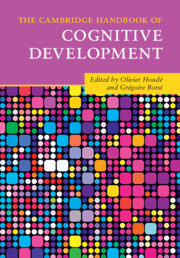Book contents
- The Cambridge Handbook of Cognitive Development
- The Cambridge Handbook of Cognitive Development
- Copyright page
- Contents
- Figures
- Tables
- Contributors
- Introduction
- Part I Neurobiological Constraints and Laws of Cognitive Development
- Part II Fundamentals of Cognitive Development from Infancy to Adolescence and Young Adulthood
- Part III Education and School-Learning Domains
- 25 Linking Cognitive Neuroscientific Research to Educational Practice in the Classroom
- 26 Literacy
- 27 Reasoning in Mathematical Development
- 28 Children’s Scientific Reasoning Skills in Light of General Cognitive Development
- 29 Working Memory Training
- 30 Interventions for Improving Executive Functions during Development
- 31 Curiosity-Driven Learning in Development
- 32 Neurocomputational Methods
- Index
- Plate Section (PDF Only)
- References
27 - Reasoning in Mathematical Development
Neurocognitive Foundations and Their Implications for the Classroom
from Part III - Education and School-Learning Domains
Published online by Cambridge University Press: 24 February 2022
- The Cambridge Handbook of Cognitive Development
- The Cambridge Handbook of Cognitive Development
- Copyright page
- Contents
- Figures
- Tables
- Contributors
- Introduction
- Part I Neurobiological Constraints and Laws of Cognitive Development
- Part II Fundamentals of Cognitive Development from Infancy to Adolescence and Young Adulthood
- Part III Education and School-Learning Domains
- 25 Linking Cognitive Neuroscientific Research to Educational Practice in the Classroom
- 26 Literacy
- 27 Reasoning in Mathematical Development
- 28 Children’s Scientific Reasoning Skills in Light of General Cognitive Development
- 29 Working Memory Training
- 30 Interventions for Improving Executive Functions during Development
- 31 Curiosity-Driven Learning in Development
- 32 Neurocomputational Methods
- Index
- Plate Section (PDF Only)
- References
Summary
Relations are ubiquitous in mathematics, from the understanding of measurement and patterns to the acquisition of algebra and fractions. In line with this observation, a growing body of literature indicate that individual differences in mathematical skills are associated with individual differences in the ability to reason about relations. In the present chapter, we review these studies and discuss what is known about the neural and behavioral development of two major forms of relational reasoning (i.e., transitive reasoning and analogical reasoning). We argue that relational reasoning may not only relate to mathematical skills because both place demands on common general cognitive resources, but also because relational reasoning and numerical skills share some underlying neurocognitive representations. Finally, the educational implications of these studies are discussed. Notably, we suggest that teachers may help scaffold the development of relational reasoning skills in the classroom by promoting situations in which children are engaged in problem-solving.
Information
- Type
- Chapter
- Information
- The Cambridge Handbook of Cognitive Development , pp. 566 - 584Publisher: Cambridge University PressPrint publication year: 2022
